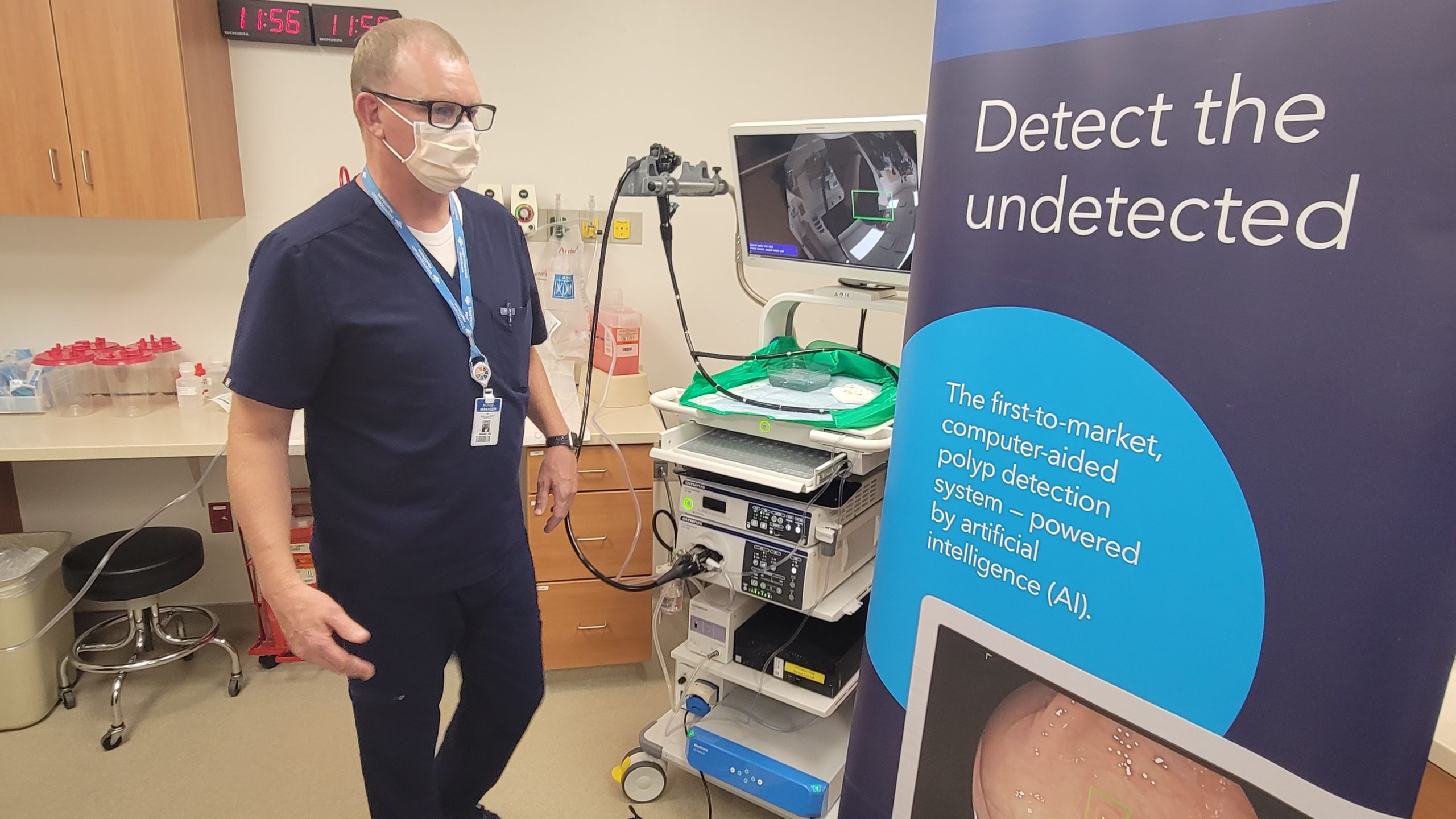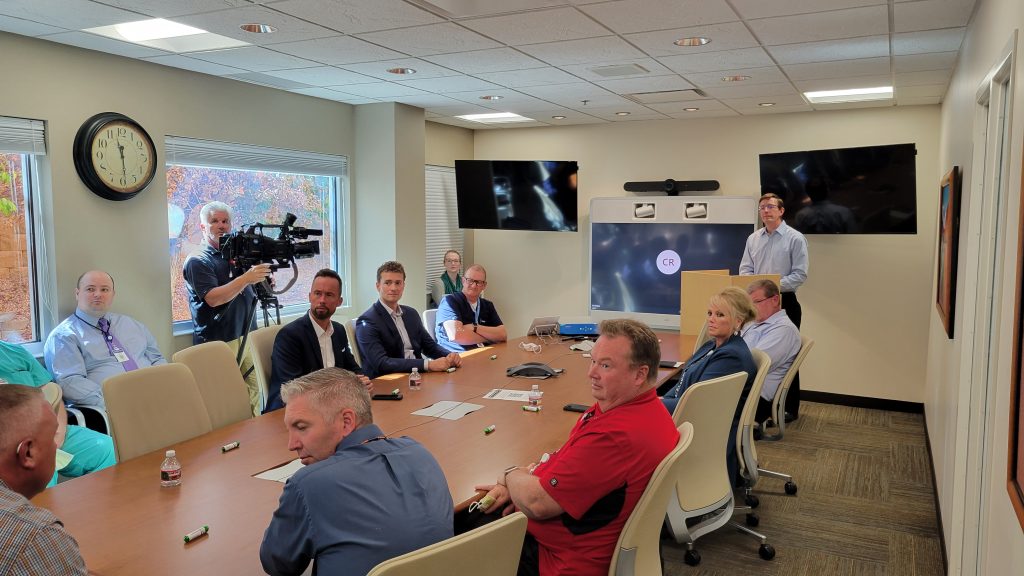CEDAR CITY — The doctors and nurses at Cedar City Hospital responsible for finding colon cancer in patients are much smarter than they were a week ago. And it’s all thanks to a blue and gray box in the endoscopy room.

That intelligence is artificial – supplied by an artificial intelligence device that helps doctors automatically detect polyps during colonoscopies.
Officials with Intermountain Healthcare and the makers of the first-of-its-kind computer system marked the official launch of the system at the Iron County hospital last Thursday. And Cedar City is one of four Intermountain hospitals that are the first in the state to use the AI system. It will be used in Cedar City before it is implemented at either St. George Regional Hospital or Intermountain’s mothership hospital in Murray.
Having a more advanced system has provided some bragging rights for Cedar City Hospital, said nursing manager Shawn Garfield.
“They do not have this at St. George,” he said. “The four rural facilities got it first.”
And Garfield said there’s a reason why the rural hospitals are getting a first crack at this advanced technology.
“We have agriculture people who don’t have time to take a day off work, so I’m really excited to see what we can do with the technology,” Garfield said. “Certain populations that we serve, we might only get them for one colonoscopy because not everybody jumps on board to go and have a colonoscopy. So if we have all the tools we can for that one colonoscopy, we’re gonna be better off.”
Called GI Genius, the AI doesn’t have HAL 9000’s forbidding red eye of “2001: A Space Odyssey” or the friendliness of C3PO from “Star Wars.” It looks like nothing more than a typical desktop computer and a monitor.

Garfield said its simplicity in looks also continues toward the simplicity in its operation.
Demonstrating the system, a green box appears on the screen around a suspected polyp.
“It’s as simple as that,” Garfield said. “That’s one of the nice things is there’s not much of a learning curve. It flashes a green box. You go and look at. It’s very simple to use.”
Medtronic engineer Matt Sanders told St. George News the way the system works is it instantly compares the images coming in of the inside of a patient’s colon with more than 13 million other images of actual polyps. It’s the equivalent of a doctor being able to instantly compare their current patient with millions of others at the same time.
Noting health privacy laws, Sanders said:
This machine does not actually take images from the patients that it’s going through. We don’t have the right and or the capability to take images that are from your private cases. What we do is we take images that have been cleared through all of our processes, and it’s an image base of 13 million. That machine then uses that database as you’re doing a colonoscopy. Every image that you’re looking at, every piece of tissue that it sees, it runs through our database of 13 million images. And then it puts a green box around anything that it sees that matches in the database.
What GI Genius is not is a cure for the dread that comes with getting a colonoscopy. It’s still, for now, going to be a long tube with a light and camera at the end inserted through the rectum. But what it will do is make that colonoscopy much more worthwhile, with the detection of potentially cancerous polyps quicker and also reduce the likelihood of misses.
“In the short term, we’re going to be picking up more polyps,” said Dr. Nathan Merriman, medical director of gastroenterology and digestive health for Intermountain Healthcare.
As the database grows and the AI examines more examples of polyps, there will be less need for repeat colonoscopies, he added.
“The effectiveness over time is going to be huge,” Merriman said. “Over time, we’ll actually see a decrease in total number of colonoscopies because each time we do a colonoscopy, it will be even more effective.”

According to the American Cancer Society, colon cancer is – excluding skin cancers – the third most common cancer in the U.S., and caused the second-most deaths of any cancer with more than 52,580 deaths expected this year. Even so, the number of deaths has been drastically reduced over the last 20 years because of early detection through colonoscopies, the society said.
Under the Affordable Care Act, routine colonoscopies are covered free of charge for most people over 45. However, repeat diagnostic colonoscopies are not. This has caused controversies around non-colonoscopy detection tools like Cologuard, which may detect polyps but still require a follow-up colonoscopy that isn’t covered by insurance.
That makes getting polyp detection on that first try not only important for the patient’s health but also for their pocketbook. Over time, it is expected that the learning computer of the GI Genius will get better at not only detecting polyps but detecting whether they pose a threat.
“The nice part of this technology is it is very iterative. So the plan over time is to make it even better and better at differentiating the pre-cancer polyps,” Merriman said.
For now, though, it is giving Cedar City doctors an extra tool in their arsenal against colon cancer. Garfield said in the around 50 colonoscopies he had already performed with GI Genius, physicians have told him it has found polyps they might have missed.
“It doesn’t change the way you do a colonoscopy, but it enhances your tools as far as detection of things that you may not pick up on with just your eyes,” Garfield said. “I’ve witnessed a couple of physicians that have said, ‘I might not have looked at that without that green box flashing up there.’”
Photo Gallery
The "Registered Livestock" Wooliam mascot outside the front doors of Cedar City Hospital, Cedar City, Utah, Oct. 12, 2022 | Photo by Chris Reed, St. George News / Cedar City News Cedar City Hospital Nurse Manager Shawn Garfield stands next the colonoscopy and GI Genius AI unit, Cedar City, Utah, Oct. 12, 2022 | Photo by Chris Reed, St. George News / Cedar City News Sign outside Cedar City Hospital, Cedar City, Utah, Oct. 12, 2022 | Photo by Chris Reed, St. George News / Cedar City News Sign outside Cedar City Hospital, Cedar City, Utah, Oct. 12, 2022 | Photo by Chris Reed, St. George News / Cedar City News Sign outside Cedar City Hospital, Cedar City, Utah, Oct. 12, 2022 | Photo by Chris Reed, St. George News / Cedar City News Sign at entrance to Cedar City Hospital, Cedar City, Utah, Oct. 12, 2022 | Photo by Chris Reed, St. George News / Cedar City News Using large scissors, Dr. Nathan Merriman, medical director of gastroenterology and digestive health for Intermountain Healthcare, opens up the new GI Genius artificial intelligence portion of Cedar City Hospital's endoscopy unit, Cedar City, Utah, Oct. 12, 2022 | Photo by Chris Reed, St. George News / Cedar City News Inside Cedar City Hospital, Cedar City, Utah, Oct. 12, 2022 | Photo by Chris Reed, St. George News / Cedar City News The colonoscopy and GI Genius AI unit inside Cedar City Hospital, Cedar City, Utah, Oct. 12, 2022 | Photo by Chris Reed, St. George News / Cedar City News "Masks required" sign outside Cedar City Hospital, Cedar City, Utah, Oct. 12, 2022 | Photo by Chris Reed, St. George News / Cedar City News An image from a placard near the colonoscopy and GI Genius AI unit inside Cedar City Hospital shows how it detects polyps inside the colon with a green box, Cedar City, Utah, Oct. 12, 2022 | Photo by Chris Reed, St. George News / Cedar City News Cedar City Hospital Nurse Manager Shawn Garfield prepares to enter the endoscopy unit, Cedar City, Utah, Oct. 12, 2022 | Photo by Chris Reed, St. George News / Cedar City News The blue and gray box is the GI Genius AI unit inside the endoscopy area of Cedar City Hospital, Cedar City, Utah, Oct. 12, 2022 | Photo by Chris Reed, St. George News / Cedar City News The blue and gray box is the GI Genius AI unit inside the endoscopy area of Cedar City Hospital, Cedar City, Utah, Oct. 12, 2022 | Photo by Chris Reed, St. George News / Cedar City News Cedar City Hospital Nurse Manager Shawn Garfield stands next the colonoscopy and GI Genius AI unit, Cedar City, Utah, Oct. 12, 2022 | Photo by Chris Reed, St. George News / Cedar City News Cedar City Hospital Nurse Manager Shawn Garfield stands next the colonoscopy and GI Genius AI unit, Cedar City, Utah, Oct. 12, 2022 | Photo by Chris Reed, St. George News / Cedar City News Inside the lobby of Cedar City Hospital, Cedar City, Utah, Oct. 12, 2022 | Photo by Chris Reed, St. George News / Cedar City News Dr. Nathan Merriman, medical director of gastroenterology and digestive health for Intermountain Healthcare, speaks to media and other gathered for the opening of the new GI Genius artificial intelligence portion of Cedar City Hospital's endoscopy unit, Cedar City, Utah, Oct. 12, 2022 | Photo by Chris Reed, St. George News / Cedar City News Restricted access sign inside Cedar City Hospital, Cedar City, Utah, Oct. 12, 2022 | Photo by Chris Reed, St. George News / Cedar City News Outside Cedar City Hospital, Cedar City, Utah, Oct. 12, 2022 | Photo by Chris Reed, St. George News / Cedar City News Outside the endoscopy area of Cedar City Hospital, Cedar City, Utah, Oct. 12, 2022 | Photo by Chris Reed, St. George News / Cedar City News Dr. Nathan Merriman, medical director of gastroenterology and digestive health for Intermountain Healthcare, speaks to media and other gathered for the opening of the new GI Genius artificial intelligence portion of Cedar City Hospital's endoscopy unit, Cedar City, Utah, Oct. 12, 2022 | Photo by Chris Reed, St. George News / Cedar City News






















Copyright St. George News, SaintGeorgeUtah.com LLC, 2022, all rights reserved.